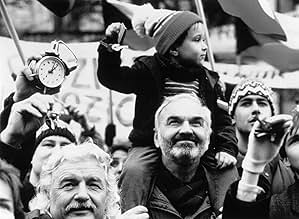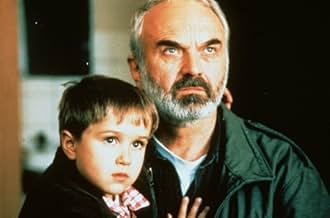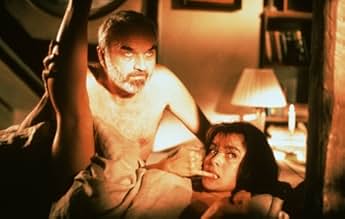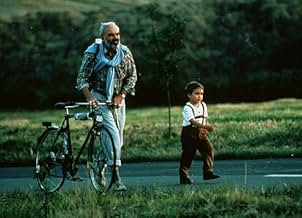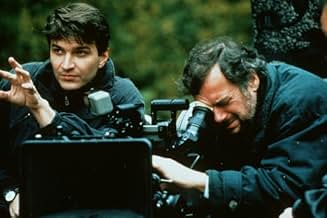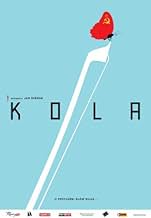A confirmed bachelor is in for the surprise of his life when a get-rich-quick scheme backfires and leaves him with a pint-sized new roommate.A confirmed bachelor is in for the surprise of his life when a get-rich-quick scheme backfires and leaves him with a pint-sized new roommate.A confirmed bachelor is in for the surprise of his life when a get-rich-quick scheme backfires and leaves him with a pint-sized new roommate.
- Director
- Writers
- Stars
- Won 1 Oscar
- 21 wins & 14 nominations total
Zdenek Sverák
- Louka
- (as Zdeněk Svěrák)
Andrey Khalimon
- Kolja
- (as Andrej Chalimon)
Irina Bezrukova
- Nadezda
- (as Irina Livanova)
Liliyan Malkina
- Tamara
- (as Lilian Malkina)
Nela Boudová
- Brozová
- (as Nella Boudová)
- Director
- Writers
- All cast & crew
- Production, box office & more at IMDbPro
Featured reviews
I like this movie very much and I am glad to read that most of you like it too. However, some comments here describe it as predictable and having the funny parts far from one another. It is not true. There are two more things that you cannot appreciate: 1) The background. I am a Czech myself and I remember the times which the film speaks about. There are many little details that probably come and go unnoticed for the foreigner eye but each of them is a symbol - it carries meaning that is so obvious for a Czech viewer. 2) The language is FUNNY! Sverak (the author) is a well known writer here. He is a GENIUS with the language, it's full of sweet little word puns that can never be translated into another language. You can translate the data, the information - but you lose the atmosphere. Believe me, even in the parts that look boring, there is something hidden between the lines - it's either funny, emotional, powerful... There is another great thing with playing with the differences between Czech and Russian. The languages are similar (to some extend) but there are differences that can result in misunderstandings - and they use it in the movie too. Czech people used to learn Russian language at schools so they can appreciate it.
I am so sorry that there is no way that you could enjoy even these parts of the movie. (Unless you'd want to learn Czech of course :-)
Just please, please, bear in mind that this is not just a shallow romantic movie. Yes, it is lovely - but there is more than that.
I am so sorry that there is no way that you could enjoy even these parts of the movie. (Unless you'd want to learn Czech of course :-)
Just please, please, bear in mind that this is not just a shallow romantic movie. Yes, it is lovely - but there is more than that.
I watched this film last night on a open air cinema in Sundance and absolutely loved it!! The story is pretty simple and not very original, yet the film manages to be unique!! (it is very similar to the film Ponnette) But what I considered to be the best part of this movie was the little boy's performance. The kid is just the best kid actor I have seen in a long while. His acting not only is fabulous but REALLY touching and convincing.
I highly recommend this movie to anyone that wants to see a well made European movie that can make you laugh and cry at the same time.
I highly recommend this movie to anyone that wants to see a well made European movie that can make you laugh and cry at the same time.
This is a variation on the theme of an older man whose emotional life is reawakened by his being thrust into unexpected parenting of a young child. Many have complained of the exploitation of such time-worn subject matter, but the worth of "Kolya" lies in the particulars of how its themes are developed. After all there are still good movies made about underdog sports teams prevailing, and even the exact same material (thinking Shakespeare here) can be made fresh through different productions.
The man in question here is Frantisek Louka, the place is the Czech Republic, and the time is 1988 (just prior to the "Velvet Revolution"). Financial constraints tempt Louka to enter into a bargain to marry a Russian woman so she can get Czech citizenship and, it turns out, escape to West Germany to be with her lover. This leaves Louka to care for the child "Kolya." One thing that makes this movie stand out is the quality of the acting by all involved. In particular Andrei Chalimon as the Russian child is very natural and will win your heart as he does Louka's. But it's a slow process.
Another thing that sets this off is the political backdrop. I knew about Russia's occupation of the Czech Republic after World War II and the non-violent overthrow of the Communist government in 1989, but that is about as far as my knowledge went. This movie portrays what it was like to live in that environment in a concrete way that a history book cannot. A lot of little scenes exemplify the underlying tensions, such as Louka's being expected to display both the Czech and Russian flags in his window, Louka's mother refusing to let some Russian soldiers in to wash their hands by lying about her having no water, and Louka's purposeful refusal to learn the Russian language. So, this movie provided a small increment in my knowledge of Czech history and that's better than nothing. How the political situation drives the action makes for a singularly interesting story.
The musical score that contains works by the Czech composers Dvořák, Suk, Fibich, and Smetana adds a special quality.
Don't be turned away from seeing this because it touches on familiar themes; it is a quality film with unique characteristics.
The man in question here is Frantisek Louka, the place is the Czech Republic, and the time is 1988 (just prior to the "Velvet Revolution"). Financial constraints tempt Louka to enter into a bargain to marry a Russian woman so she can get Czech citizenship and, it turns out, escape to West Germany to be with her lover. This leaves Louka to care for the child "Kolya." One thing that makes this movie stand out is the quality of the acting by all involved. In particular Andrei Chalimon as the Russian child is very natural and will win your heart as he does Louka's. But it's a slow process.
Another thing that sets this off is the political backdrop. I knew about Russia's occupation of the Czech Republic after World War II and the non-violent overthrow of the Communist government in 1989, but that is about as far as my knowledge went. This movie portrays what it was like to live in that environment in a concrete way that a history book cannot. A lot of little scenes exemplify the underlying tensions, such as Louka's being expected to display both the Czech and Russian flags in his window, Louka's mother refusing to let some Russian soldiers in to wash their hands by lying about her having no water, and Louka's purposeful refusal to learn the Russian language. So, this movie provided a small increment in my knowledge of Czech history and that's better than nothing. How the political situation drives the action makes for a singularly interesting story.
The musical score that contains works by the Czech composers Dvořák, Suk, Fibich, and Smetana adds a special quality.
Don't be turned away from seeing this because it touches on familiar themes; it is a quality film with unique characteristics.
Who knows what you will do when your back is against the wall? Survival makes you do some things that you would never try. In this case Louka (Zdenek Sverák), a confirmed bachelor, marries a Russian woman to get her Czech papers and to get him some money to buy a car and fix his house and pay some debts.
As soon as they marry, she heads to Germany. her son, Kolja (Andrei Chalimon), a little five-year-old, ends up with Louka, who soon finds that he is bonding with the boy.
It is a beautifully touching story with some outstanding performances by the two leads and Libuse Safránková as Klara.
It is fascinating that star and writer of the screenplay is also the father of the director. I cannot imagine how that worker, but I bet it was interesting at times.
As soon as they marry, she heads to Germany. her son, Kolja (Andrei Chalimon), a little five-year-old, ends up with Louka, who soon finds that he is bonding with the boy.
It is a beautifully touching story with some outstanding performances by the two leads and Libuse Safránková as Klara.
It is fascinating that star and writer of the screenplay is also the father of the director. I cannot imagine how that worker, but I bet it was interesting at times.
10CBW-2
I did not think this film was at all sentimental (if you are using the word in its pejorative sense). In reading the comments on this film, I noticed the Czechs who responded were rather lukewarm about it. This surprises me. Kolya works as a film on several levels at once -- political, artistic, personal, etc. and I do not think it is at all predictable. The performances are magical and the entire film is encased by music of very great beauty and humanity by Dvorak and other great Czech composers. Music from Dvorak's "Four Biblical Songs" is at the heart of the film. It is the song that Klara sings at the funerals and the song Kolya is singing before and during the closing credits. The vintage film footage of Kubelik conducting Smetana's Ma Vlast at a concert at the end of the Russian occupation is a wonderful touch. Although I'm sure many other Czech films deserve Oscars, I am glad Kolya was recognized. I hope this film is released on DVD soon.
Did you know
- TriviaThe child actor who plays Kolja, Andrey Khalimon, was not cast until three weeks before filming started.
- GoofsThroughout the movie, many background cars are clearly newer than 1989 models. The film is set in 1989.
- ConnectionsFeatured in 54th Golden Globe Awards (1997)
- How long is Kolya?Powered by Alexa
Details
- Release date
- Countries of origin
- Official site
- Languages
- Also known as
- Коля
- Filming locations
- Production companies
- See more company credits at IMDbPro
Box office
- Gross US & Canada
- $5,770,254
- Gross worldwide
- $5,770,254
- Runtime
- 1h 51m(111 min)
- Color
- Sound mix
- Aspect ratio
- 1.66 : 1
Contribute to this page
Suggest an edit or add missing content


